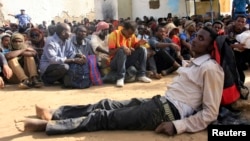The U.N. Security Council has designated six human traffickers for international sanctions for their exploitation of thousands of migrants off Libya's coast.
The six men — four Libyans and two Eritreans — head up criminal networks and militias that exploit sub-Saharan African migrants seeking to cross the Mediterranean to Europe and beyond. The sanctions, which went into effect immediately on Thursday, will freeze their bank accounts and prohibit them from traveling internationally.
This is the first time the council has imposed sanctions on the leaders of violent human-trafficking and people-smuggling networks.
In November, cable news channel CNN broadcast video of smugglers in Libya auctioning off African migrants at a slave market, casting a spotlight on the abuse.
"Today's sanctions send a strong message that the international community is united in seeking accountability for perpetrators of human trafficking and smuggling," U.S. Ambassador Nikki Haley said in a statement. "There is no place in our world for such abuses of human rights and human dignity."
The Netherlands, a council member, put forward the six individuals for sanctions.
Among them are Mus'ab Abu-Qarin, who is accused of organizing an April 2015 crossing that ended in the shipwreck deaths of 800 people; Abd al Rahman al-Milad, who heads the regional unit of the Coast Guard in Zawiya and is believed to collaborate with the smugglers; and two Eritreans — Fitiwi Abdelrazak and Ermias Ghermay — who traffic tens of thousands of mostly Horn of Africa migrants to the coast of Libya and onward to Europe and the United States.
Also listed are Libyan militia commanders Ahmad al-Dabbashi and Mohammed Kachlaf.
"This Dutch initiative sends a clear message," Foreign Minister Stef Blok said in a statement. "We are tackling human trafficking in Libya."
The European Union has been working for several years to discourage migrants from making the dangerous and often deadly trip through Africa and across the Mediterranean. Its naval forces run Operation Sophia, which identifies, captures and destroys vessels belonging to the smugglers.
Political rivals seeking to control Libya have kept the country in armed conflict and chaos for years, making the territory fertile ground for human traffickers, militias and terrorist groups.





